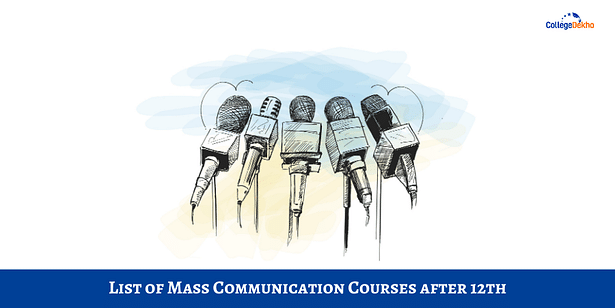Mass Communication is an exciting field, sought by many 12th-pass students these days. If you too are interested, explore the list of Mass Communication courses after 12th, their eligibility criteria, top colleges, fees, career opportunities, and more on this page!
- What is a Mass Communication Course?
- Benefits of Pursuing Mass Communication After 12th
- List of Mass Communication Courses after 12th
- Mass Communication after 12th: Eligibility Criteria
- Mass Communication after 12th: Entrance Exams
- Mass Communication after Class 12: Selection Criteria
- Course-wise Mass Communication Syllabus
- Skills Required for Mass Communication
- Mass Communication Colleges in India after 12th
- Mass Communication Institutes Abroad
- Mass Communication Course Fees
- Mass Communication Jobs and Job Profiles After 12th
- Mass Communication Salary Scope After 12th
- Mass Communication After 12th: Top Recruiters
- Faqs

List of Mass Communication Courses after 12th: Mass communication has become a highly sought-after discipline for aspirants to pursue higher education due to the boom in those sectors of the economy that are heavily dependent on mass communication and its channels. Mass communication courses after 12th have also evolved owing to changing needs and demands of the industry and so have the scope of job opportunities after mass communication courses. This rise in the demand for different types of mass communication courses has also lead to several top-ranked institutes and universities offering excellent courses in the discipline.
Aspirants who wish to purse mass communication after 12th have several opportunities ahead of them. Some of the common job roles that are available to mass communication course graduates include Journalists, Digital News Writers or Content Writer, Freelance Journalists, Video editors, News Writers, Photographers/Videographers, Anchors/Hosts, Investigative Journalists, Mobile Journalists (MoJo), Content Creators, Photo Journalists, Event managers, etc. Candidates will find all the necessary information about Mass communication courses after 12th in the article below
Also Read: Mass Communication Vs Animation
What is a Mass Communication Course?
The Mass Communication course trains students who are interested in this field and equips them with the necessary qualities. Quite often, Mass Communication is confused with journalism. People mostly wonder about the difference between Mass Communication and journalism. In basic terms, journalism is like a subset of Mass Communication. Both the courses are different from each other in all respects.
Now ‘What is a Mass Communication course? the term "Mass Communication" is not limited to journalism but it spreads its branches to various other media fields like news gathering and news reporting, event management, film direction, and production, public relations, corporate communication, advertising, etc. The Mass Communication course offers numerous career opportunities in Mass Communication to candidates that pay well and provide job satisfaction to them and enhance their expression of creativity. Although the answer to 'What is Mass Communication course?' cannot be limited to the definition above, it is a pretty comprehensive summation of the course.
Benefits of Pursuing Mass Communication After 12th
Take a look at the major advantages of pursuing mass communication after 12th:
- One of the biggest advantages of pursuing mass communication is the improvement of a student’s communication skills. This will help them in their academic, professional, and personal lives.
- Candidates will learn a range of skills related to different types of research, reporting, investigation, writing, etc.
- Apart from soft skills, aspirants will also gain technical skills during their mass communication skills including photography, and videography skills, layout designing, radio programming and production, packaging news, video production, editing copies, etc.
- Candidates will also develop their interpersonal skills and develop their vocabulary, communication, and overall personality, especially if they pursue journalism.
- Finally, joining mass communication courses after 12th also helps in networking and building connections with other aspirants which might help candidates during their professional careers.
List of Mass Communication Courses after 12th
Mass Communication courses are quite diverse and they rope in all the important components of media. There are several levels of courses to suit the requirements and interests of the candidates who wish to pursue a career in the field. Students can choose from the plethora of Mass Communication courses and select the program that suits them based on the Mass Communication course fees, Mass Communication salary offered, and their future goals. These programs of Mass Communication are offered in all top Mass Communication colleges in India. There are UG, PG, Diploma, and Doctoral level courses in Mass Communication. Some of the most popular courses in Mass Communication are given in the table below.
Undergraduate Mass Communication Courses
Name of the Course | Duration |
|---|---|
3 years | |
BA Hons Journalism & Mass Communication (BJMC) | 3 years |
3 years | |
3 years | |
BA Hons in Hindi Journalism & Mass Communication (BHJMC) | 3 years |
B.A. Film Making and Mass Communication | 3 years |
Postgraduate Mass Communication Courses
Name of the Course | Duration |
|---|---|
M.A in Journalism and Mass Communication | 2 years |
Post Graduate Diploma in Business Journalism & Corporate Communication (DBJCC) | 1 year |
P.G. Certificate Course in Hindi Journalism | 1 year |
P.G. Diploma in Hindi Journalism | 2 years |
Doctoral Mass Communication Courses
Name of the Course | Duration |
|---|---|
Ph.D. in Mass Communication | 2 years |
Also Read:List of Mass Communication Courses after Class 10th
Mass Communication after 12th: Eligibility Criteria
Students who aspire to go forward in the field of Mass Communication or journalism have to fulfill certain eligibility criteria for Mass Communication. Different colleges have different Mass Communication eligibility criteria for selecting students. Candidates must fulfill the eligibility of Mass Communication to secure a seat in the college or institute of their choice.
To pursue any journalism and Mass Communication course diploma programme, candidates will have to first complete their education up to class 12 from a recognized board of education, in any stream of education.
Candidates are required to score at least 45% to 50% marks in class 12 to be eligible for the undergraduate degree courses.
However, post-graduate degree and diploma courses require you to possess a graduation degree and diploma respectively with at least 50% marks.
Mass Communication after 12th: Entrance Exams
Aspirants can check out the list of Mass Communication exams in India accepted by different colleges and institutes. It is important that candidates check out the colleges that accept these exams, their Mass Communication course fees, and the Mass Communication salary offered by them during placements.
Name of the Exam | Conducting Body | Level | Exam Pattern/Duration |
|---|---|---|---|
Xavier Institute of Communications | PG | Pattern: 100 MCQ questions, 3 Subjective questions for 50 marks. Duration: 1 hour 30 minutes. | |
Indian Institute of Mass Communication (IIMC) | PG | Pattern: 2 sittings on the same day with 100 MCQ questions each Duration: 2 hours Each sitting. | |
MASCOM Entrance Exam | PG | Pattern: 200 marks Duration: 4 hours 15 minute | |
PG | Pattern: Objective Type Duration: 3 Hours | ||
Jamia Milia Islamia Entrance Exam (JMI) | Jamia Milia Islamia University | UG/ PG | Pattern: 170 marks Duration: 3 hours |
UG & PG | Pattern: 150 questions Duration: 2.5 hours | ||
UG | Pattern: 150 MCQ questions. Duration: 2 hours 30 minutes. | ||
AUCET | PG | Pattern: 100 questions Duration: 1.5 hours | |
Symbiosis International University | UG | Pattern: 60 questions Duration: 1 hour | |
ACJ Entrance Exam | PG | Pattern: 200 marks Duration: 2 hours | |
UG & PG | Pattern: 200 questions Duration: 2.5 hours |
Also Read: Mass Communication Entrance Exams in India
Mass Communication after Class 12: Selection Criteria
The selection process for Mass Communication has been given here. Apart from the eligibility criteria, it is also important to know about the Mass Communication course fees and the Mass Communication salary offered by various colleges. Colleges proceed with their Mass Communication selection process after shortlisting candidates who qualify for their Mass Communication eligibility criteria.
Admission to most of the top Mass Communication colleges is done based on Class 12th/ bachelor's degree/ master's degree aggregate marks (depending on the course applying to)
Some of the popular universities including KIIT University, BHU, and GGSIPU conduct entrance exams for admission to Mass Communication Courses.
Colleges may also conduct Group Discussions as well as Personal Interviews to assess the communication skills of candidates before offering a seat.
Course-wise Mass Communication Syllabus
The syllabus for Mass Communication courses includes a wide range of topics and subjects that enhance an aspirant's knowledge of various aspects of this discipline. Typically, the subjects covered in a Mass Communication course include all the components of media and communication and teach students about the various channels that come under the board head of Mass Communication in depth. Some of the common Mass Communication subjects are given below.
BJMC Syllabus
One of the most popular courses in Mass Communication, the subjects included in the BJMC (Bachelor in Journalism and Mass Communication) syllabus are meant to aid candidates in strengthening their basics of Mass Communication as a discipline as well as help them understand more advanced topics later in their academic course. The subjects of a BJMC syllabus are given below.
Introduction to Journalism (Reporting, Writing, and Editing) | Basics of Camera, Lights, and Sound |
|---|---|
Writing for Media | Media Management |
Indian Culture | Folk Media |
Socio-Economic and Political Scenario | Television Journalism, and Production |
Basics of Design and Graphics | Public Relations |
Print Journalism | Introduction to Advertising |
History of Print and Broadcasting in India | Fundamentals of Economics and Indian Economy |
Media Laws and Ethics | National and International Affairs |
Still Photography | Advertising Practices |
Theory of Communication | Media Research |
State Politics and the Constitution | Event Management: Principles and Methods |
Application of Computer in Media | Environment Communication |
Development and Communication | Communication Research |
Radio Journalism and Production | Tribal Communication |
Value Education | Media Organisation and Management |
Global Media Scenario | Contemporary Issues |
MJMC Syllabus
A MJMC (Masters in Journalism and Mass Communication) is the next stage for aspirants who wish to pursue Mass Communication. The syllabus for an MJMC course is much more advanced than that of undergraduate level courses in this discipline and aspirants will need a certain level of knowledge and skills to undertake this curriculum. The subjects of a MJMC course are given below:
Introduction to Communication | New Media Technology |
|---|---|
Electronic Media | Intercultural and International Communication |
Print Media in India: Growth and Development | Media and Human Rights |
Print Media - Reporting & Desk | Public Relations and Corporate Communication |
Advertising | Film Studies |
Current Affairs | Photography |
Media Management | Media and Society |
Development Communication | Intercultural Communication |
Media Law and Ethics | Environment Communication |
Radio and TV Production Techniques | Print Media |
Mass Communication Subjects
Candidates can find the list of Mass Communication course subjects in the table mentioned below.
Aesthetics and Visual Communication | Camera and Lighting |
|---|---|
Photography | Feature Writing |
Journalism | Audiography and Music |
Audio-Visual Communication | News Reporting and Editing |
Marketing and Mass Communication | - |
Skills Required for Mass Communication
Candidates need to have certain skills if they want to achieve great heights in Mass Communication. Some important skills that are required for the profession of Mass Communication are given below.
The most basic skill required in the field of Mass Communication is good communication and writing ability.
Candidates must have a flair for the language in which they wish to pursue Mass Communication programs.
Graduates in this field must have the ability to network and create media contacts to get the latest insights.
The ability to work in rough conditions and under pressure is another requirement.
Here is the table depicting the required skill set to pursue the Mass Communication course.
Creativity | Confidence | Networking skills |
|---|---|---|
Communication skills | Ability to work under strict deadlines | Interviewing skills |
Ability to work under rough conditions | Research skills | Problem-solving skills |
Ability to express ideas and thoughts clearly | Observation skills | Critical thinking |
Good interviewing skills | Interpretation skills | Aptitude for presenting information in a precisely and effectively |
Mass Communication Colleges in India after 12th
India has some of the leading colleges of Mass Communication. Every year, thousands of students flock to these colleges for seeking admission in their Mass Communication courses. Some of the best Mass Communication colleges in India are given below along with their Mass Communication course fees. Aspirants are also advised to check the Mass Communication salary offered by these colleges during placements.
Name of the College | Courses Offered |
|---|---|
Bachelor of Journalism and Mass Communication (BJMC) | |
National Institute of Mass Communication and Journalism, Ahmedabad |
|
Bachelor of Journalism and Mass Communication (BJMC) | |
Bachelor of Journalism and Mass Communication (BJMC) | |
Bachelor of Journalism and Mass Communication (BJMC) | |
Bachelor of Journalism and Mass Communication (BJMC) | |
Bachelor of Journalism and Mass Communication (BJMC) | |
Bachelor of Journalism and Mass Communication (BJMC) | |
BA Mass Communication | |
Bachelor of Mass Media (BMM) | |
|
Mass Communication Institutes Abroad
Mass communication as a discipline is in demand not only in India but outside the country as well. In fact, some aspirants argue that they have better prospects in the mass communication industry if they pursue their higher education in the field from foreign colleges and universities. Candidates who pursue mass communication abroad will not only gain better exposure but will also develop their interpersonal skills. Some of the top mass communication institutions abroad include:
Name of College/University | Location |
|---|---|
The University of Lincoln | United Kingdom |
The University of British Columbia | Canada |
The University of Melbourne | Australia |
McGill University | Canada |
University of California | United States of America |
University of Amsterdam | Netherlands |
Teesside University | United Kingdom |
Columbia University | United States of America |
The University of the West of England | United Kingdom |
Hofstra University | United States of America |
Mass Communication Course Fees
The Mass Communication course fees from government colleges will be less than that of private colleges. The Mass Communication course fees will also vary from course to course. If your course comprises multimedia education as well then it will probably cost you more than the core Mass Communication and journalism courses.
The fees of government colleges will vary from INR 11,659 to INR 1,10,000 for the entire course. However, fees for Mass Communication courses offered by private universities will vary from INR 2.5 to INR 8.5 lakh for the entire course approximately.
Mass Communication Jobs and Job Profiles After 12th
With electronic and paper media being the main pillars of Indian communication, there is a lot of scope in the journalism and Mass Communication industry. There are numerous media houses, news channels, magazines, and newspapers that hire Mass Communication graduates and offer excellent Mass Communication salary to different levels of professionals.
Apart from that, you can also apply for roles like copywriter, content writer, blogger, etc. after completing your graduation in this field. Following are some of the highest-paying profiles in this field:
TV Anchor | Freelance Writer/ Reporter |
|---|---|
News Editor | Special Correspondent |
Senior Journalist | Radio Jockey |
Junior Journalist | Video Jockey |
Screen Writer | TV Correspondent |
Columnists | Fashion Photographer |
PhotoJournalist | Journalist |
News Analyst | Feature Writer |
Mass Communication Salary Scope After 12th
Mass Communication is one of the fields where experience greatly alters the salary. The more your experience, the better Mass Communication salary you’ll get. If you are graduating from colleges like IIMC, Symbiosis Institute of Media and Communication, etc., then your chances of getting a good salary increase immensely.
The starting salary in this field will vary from INR 12,000 to INR 25,000 per month. After gaining experience of 5 years, you can expect a salary of INR 50,000 to INR 1,00,000 per month. It is essential to pursue Mass Communication courses from reputed colleges to get a good package.
Mass Communication After 12th: Top Recruiters
Various career options are available to aspirants having a degree in Mass Communication. There are several companies that offer a lucrative Mass Communication salary for both freshers and experienced professionals. Here’s the table displaying the major recruiting companies for Mass Communication in India.
Hindustan Times | Times Group | The Hindu |
|---|---|---|
The Pioneer | India Today Group | Indian Express |
Doordarshan | Outlook | India TV |
NDTV | All India Radio | Network 18 |
Cineyug Entertainments | Zee Network | BBC |
Wizcraft Entertainment | Star India | Balaji Telefilms Limited |
Also Read: Top 10 Career Options After Mass Communication
Candidates should also check out the articles mentioned below to know more about the Mass Communication course fees for different colleges, the Mass Communication salary offered during the placements season, and other details.
Related Links:
Hopefully, we are able to answer your queries regarding the best Mass Communication colleges, their Mass Communication course fees, the Mass Communication salary offered by them, and what is Mass Communication course in general. For more information about Mass Communication colleges, courses, and their fees, stay tuned to CollegeDekho.

















Similar Articles
Types of Journalism - Which is Right for You?
Top 10 Film Schools in India for 2024: Film Making Courses, Fees, Admission, Career Scope
Top Companies That Hire Mass Communication graduates
SET BA Mass Communication 2024 Admission: Eligibility Criteria, Application Form, Exam Pattern, Fee Structure
Career Options in Film Studies Degree
Top 10 Career Options After Mass Communication